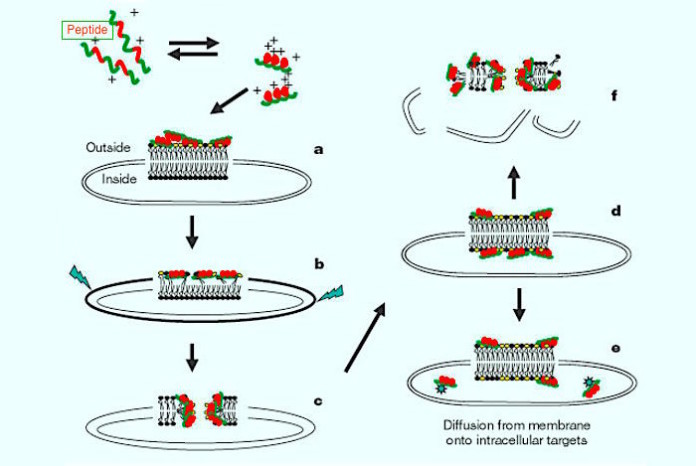
One area being explored is host defense peptides, also known as antimicrobial peptides or AMPs, natural parts of innate immune response found in every classification of life. AMPs are broad spectrum and have been demonstrated to kill everything from viruses to gram-negative bacteria with a variety of modes of action.
This new work, published in the journal Small, new developments in antimicrobial peptides are described. Scientists at the Institute of Bioengineering and Nanotechnology (IBN) at Agency for Science, Technology and Research (A*STAR) Singapore, led by Yugen Zhang, have made a molecule from a linked chain of chemicals, called imidazolium oligomers. They’ve demonstrated that it can kill E. coli bacteria by penetrating the cell membrane due in part to the chain structure. That is of particular benefit; traditional antibiotics leave the cell membrane intact, which can allow antibiotic resistance material to grow.
“Our unique material can kill bacteria rapidly and inhibit the development of antibiotic-resistant bacteria. Computational chemistry studies supported our experimental findings that the chain-like compound works by attacking the cell membrane. This material is also safe for use because it carries a positive charge that targets the more negatively charged bacteria, without destroying red blood cells,” explains Dr Zhang.
The imidazolium oligomers are simply a white powder that is soluble in water. The research team determined that if the powder was dissolved in alcohol, gels spontaneously formed. This stuff could be used in alcohol sprays that sterilize hospitals or homes.
“The global threat of drug-resistant bacteria has given rise to the urgent need for new materials that can kill and prevent the growth of harmful bacteria. Our new antimicrobial material could be used in consumer and personal care products to support good personal hygiene practices and prevent the spread of infectious diseases,” said the Executive Director of IBN, Professor Jackie Y. Ying.
While E. coli is normally found in the intestines of humans and animals, there are some strains that can cause serious illness and even death. That kind of bacterial infection is also contagious and can spread easily through contaminated food or water, or just from contact with people or animals. Good hygiene practices like hand washing can help prevent E. coli infections.
Other than E. coli, the team also tested IBN’s new material against other common strains of antibiotic-resistant bacteria and fungi, such as Candida albicans, Staphylococcus aureus, and Pseudomonas aeruginosa. These pathogens can cause conditions ranging from skin infections to pneumonia and toxic shock syndrome. The material killed 99.9% of those microbes within just two minutes.
This rapid bacteria-killing material might just be a powerful new weapon against drug-resistant microbes.
Source: LabRoots










































